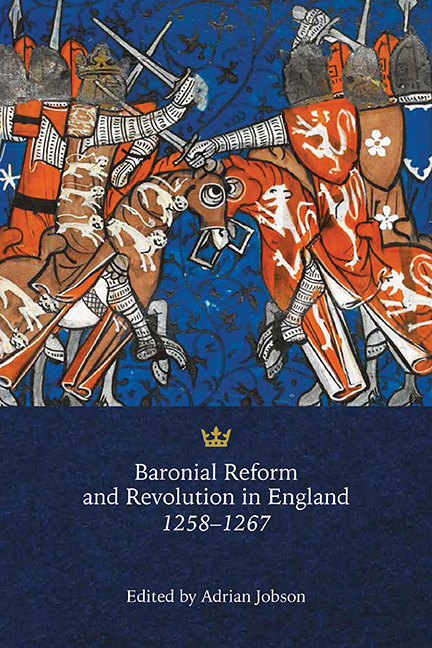Book contents
- Frontmatter
- Dedication
- Contents
- List of Illustrations
- Acknowledgements
- List of Abbreviations
- Introduction
- Modern Historians and the Period of Reform and Rebellion, 1258–1265
- The Secret Revolution of 1258
- Baronial Reform, the Justiciar’s Court and Commercial Legislation: The Case of Grimsby
- Crisis Management: Baronial Reform at the Exchequer
- Local Administration during the Period of Reform and Rebellion
- What Happened in 1261?
- Writing Reform and Rebellion
- Civic Government in Troubled Times: London c.1263–1270
- The Montfortian Bishops
- Reformers and Royalists: Aristocratic Women in Politics, 1258–1267
- The Midlands Knights and the Barons’ War: The Warwickshire Evidence
- Retinues, Agents and Garrisons during the Barons’ Wars
- The Barons’ War in the North of England, 1264–1265
- The Maritime Theatre, 1258–1267
- Reasserting Medieval Kingship: King Henry III and the Dictum of Kenilworth
- Index
What Happened in 1261?
Published online by Cambridge University Press: 21 May 2021
- Frontmatter
- Dedication
- Contents
- List of Illustrations
- Acknowledgements
- List of Abbreviations
- Introduction
- Modern Historians and the Period of Reform and Rebellion, 1258–1265
- The Secret Revolution of 1258
- Baronial Reform, the Justiciar’s Court and Commercial Legislation: The Case of Grimsby
- Crisis Management: Baronial Reform at the Exchequer
- Local Administration during the Period of Reform and Rebellion
- What Happened in 1261?
- Writing Reform and Rebellion
- Civic Government in Troubled Times: London c.1263–1270
- The Montfortian Bishops
- Reformers and Royalists: Aristocratic Women in Politics, 1258–1267
- The Midlands Knights and the Barons’ War: The Warwickshire Evidence
- Retinues, Agents and Garrisons during the Barons’ Wars
- The Barons’ War in the North of England, 1264–1265
- The Maritime Theatre, 1258–1267
- Reasserting Medieval Kingship: King Henry III and the Dictum of Kenilworth
- Index
Summary
The story of how Henry III overthrew the Provisions of Oxford and reversed the great political revolution of 1258 in the course of 1261 is surprisingly complicated. The crisis caused by the recovery of royal power dragged on for most of the year. David Carpenter describes the king's tactics during that period of high tension and near civil war as ‘carefully modulated’. Henry fled, in February, to the Tower of London from the council of magnates and officials imposed upon him by the Provisions. Most unusually, he remained in the Tower for much of 1261, a measure of the reaction he had unleashed.
Early in March, Henry published a manifesto, his ‘grievances against the council’, but avoided a clash of arms with the Provisions’ supporters thanks to a truce and dispersal of parliament. Arbitration over his complaints was deferred until his heir, the Lord Edward, returned to England; it was probably held in Holy Week (c.22 April). Talks failed, but in the meantime Henry rallied support at home and abroad, and in the first week of May dashed from London to Dover. He dismissed the council-appointed castellan and secured the landing of mercenaries and papal bulls quashing the Provisions. After retreating back to London, Henry ventured out again to Winchester where during a brief Whitsun stay (c.12 June) he finally published the papal annulment of his oath to the Provisions and appointed new royalist great officers of state. Returning to the Tower, he also (on 8–12 July) appointed new sheriffs, castellans and keepers of the royal forests. In July, after the collapse of further talks, opposition magnates appealed to Louis IX to intervene. By mid-August sporadic resistance began against the new sheriffs. From then on, both sides canvassed wider support, particularly from the localities. Henry issued a general manifesto to the shires on 16 August. The opposition summoned three knights from each shire to parliament at St Albans on 21 September, but Henry countered with orders for parliament to meet before him at Windsor.
During the summer months of August and September, Henry was able to adjourn to the security and comforts of Windsor Castle. But by 14 October he was back in the Tower.
- Type
- Chapter
- Information
- Baronial Reform and Revolution in England, 1258-1267 , pp. 89 - 108Publisher: Boydell & BrewerPrint publication year: 2016



